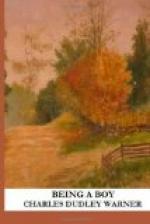So they come and go all the summer afternoon; but the great event of the day is the passing down the valley of the majestic stage-coach, —the vast yellow-bodied, rattling vehicle. John can hear a mile off the shaking of chains, traces, and whiffle-trees, and the creaking of its leathern braces, as the great bulk swings along piled high with trunks. It represents to John, somehow, authority, government, the right of way; the driver is an autocrat, everybody must make way for the stage-coach. It almost satisfies the imagination, this royal vehicle; one can go in it to the confines of the world,—to Boston and to Albany.
There were other influences that I daresay contributed to the boy’s education. I think his imagination was stimulated by a band of gypsies who used to come every summer and pitch a tent on a little roadside patch of green turf by the river-bank not far from his house. It was shaded by elms and butternut-trees, and a long spit of sand and pebbles ran out from it into the brawling stream. Probably they were not a very good kind of gypsy, although the story was that the men drank and beat the women. John didn’t know much about drinking; his experience of it was confined to sweet cider; yet he had already set himself up as a reformer, and joined the Cold Water Band. The object of this Band was to walk in a procession under a banner that declared,
“So here we pledge
perpetual hate
To all that can
intoxicate;”
and wear a badge with this legend, and above it the device of a well-curb with a long sweep. It kept John and all the little boys and girls from being drunkards till they were ten or eleven years of age; though perhaps a few of them died meantime from eating loaf-cake and pie and drinking ice-cold water at the celebrations of the Band.




